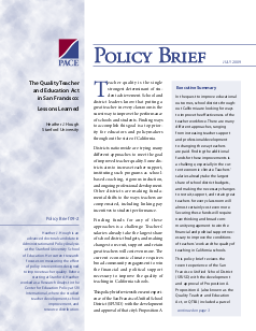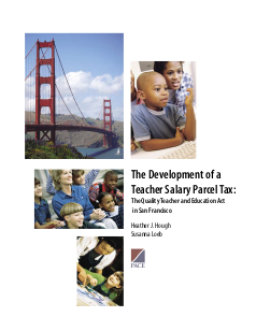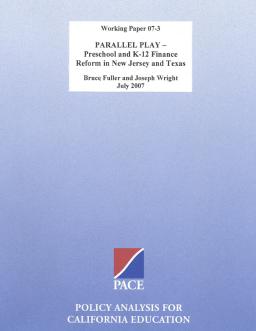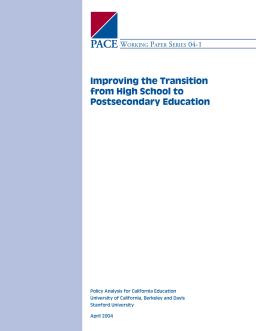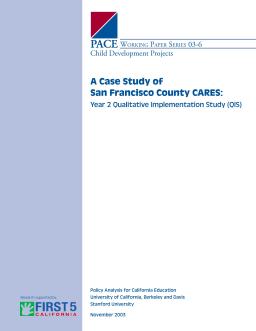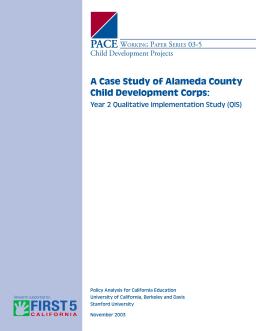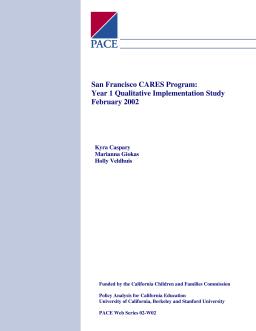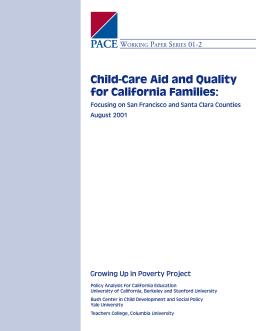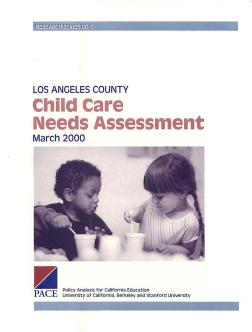Lessons Learned
Published
Summary
This policy brief examines the recent development and approval of Proposition A in the San Francisco Unified School District, which included a parcel tax for increasing teacher salaries, introducing flexibility to the salary schedule, and strengthening accountability for teacher performance. The author describes how the district and union worked together to increase compensation and align school district goals with teacher salaries.
The Quality Teacher and Education Act in San Francisco
Published
Summary
This policy report reviews the approval of Proposition A, a parcel tax initiative in the San Francisco Unified School District, which aimed to improve teacher salaries and fund innovative compensation programs. The report includes an assessment of the programs funded by the tax revenues, and is based on interviews and public documents.
Preschool and K–12 Finance Reform in New Jersey and Texas
Published
Summary
This report examines factors that affect student achievement in California schools, finding that family background and school context are important determinants. The report recommends that schools focus on providing high-quality instruction, improving reading and math skills, and creating a positive school climate. Policymakers should increase resources for under-resourced schools and promote parental involvement. Continued research is needed to better understand the complex factors that shape student outcomes.
Published
Summary
The Bridge Project, a study of K-16 issues, presents three papers on college transition. The first finds a widespread lack of knowledge about college requirements and readiness among California students and parents. The second analyzes how students receive vague signals about academic college readiness. The third provides an example of how to improve K-16 transition and send clearer academic standards signals. Policy implications include low or no-cost recommendations to address these issues.
Year 2 Qualitative Implementation Study (QIS)
Published
Summary
This paper assesses the perspectives and experiences of stakeholders on San Francisco County’s CARES program, a childcare retention–incentive program. Year 2 saw over a threefold increase in the number of stipends awarded, but recipients felt the program couldn't address ECE staff retention/turnover alone. Solutions need to be implemented within a larger system of support, raising public awareness, expanding professional development opportunities, and exerting pressure on policymakers for sustained funding to augment ECE staff salaries.
Year 2 Qualitative Implementation Study (QIS)
Published
Summary
This paper discusses the second year of Alameda County’s Child Development Corps program as a childcare retention-incentive program. The program's goals were to encourage staff training, professional development, and establish a strong network of ECE professionals. Stipend recipients were pleased with the program but recognized that it could not function alone in addressing staff retention, and a larger system of support and advocacy was necessary.
Year 1—Qualitative Implementation Study
Published
Summary
This report on San Francisco County’s CARES program (SF CARES) provides guidance for policymakers, program administrators, and childcare advocates planning similar initiatives. PACE collected feedback from program planners, stipend recipients, and other childcare community members on aspects of the planning and implementation process. SF CARES successfully distributed over 400 stipends in the program’s first year, but challenges remain in reaching a broader array of childcare providers and communicating program goals.
Focusing on San Francisco and Santa Clara Counties
Published
Summary
This report analyzes California's early childhood education programs and finds that attending public preschool programs improves school readiness and academic performance, particularly for low-income children. The study also shows that the economic benefits of preschool programs far outweigh the costs, including increased earnings and decreased need for remedial education and social services. Recommendations include expanding access to high-quality preschool programs for low-income children in California to reduce economic inequality.
Published
Summary
A study conducted for the Los Angeles County Department of Public Social Services aimed to determine the supply and demand of licensed childcare in the county, with a focus on low-income communities and special types of care. The survey analyzed data at three levels: county-wide, service planning areas, and supervisorial districts. Results showed disparities in childcare supply across the county, with shortages in special types of care and little information on where childcare is needed.
